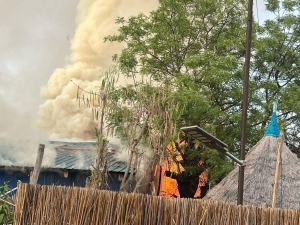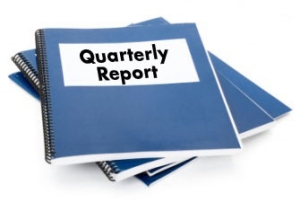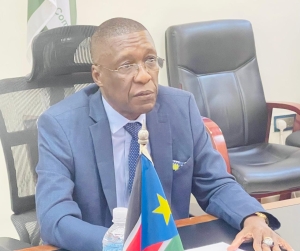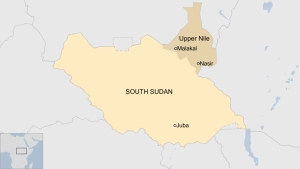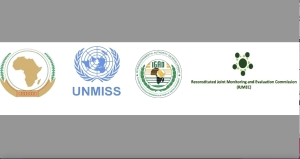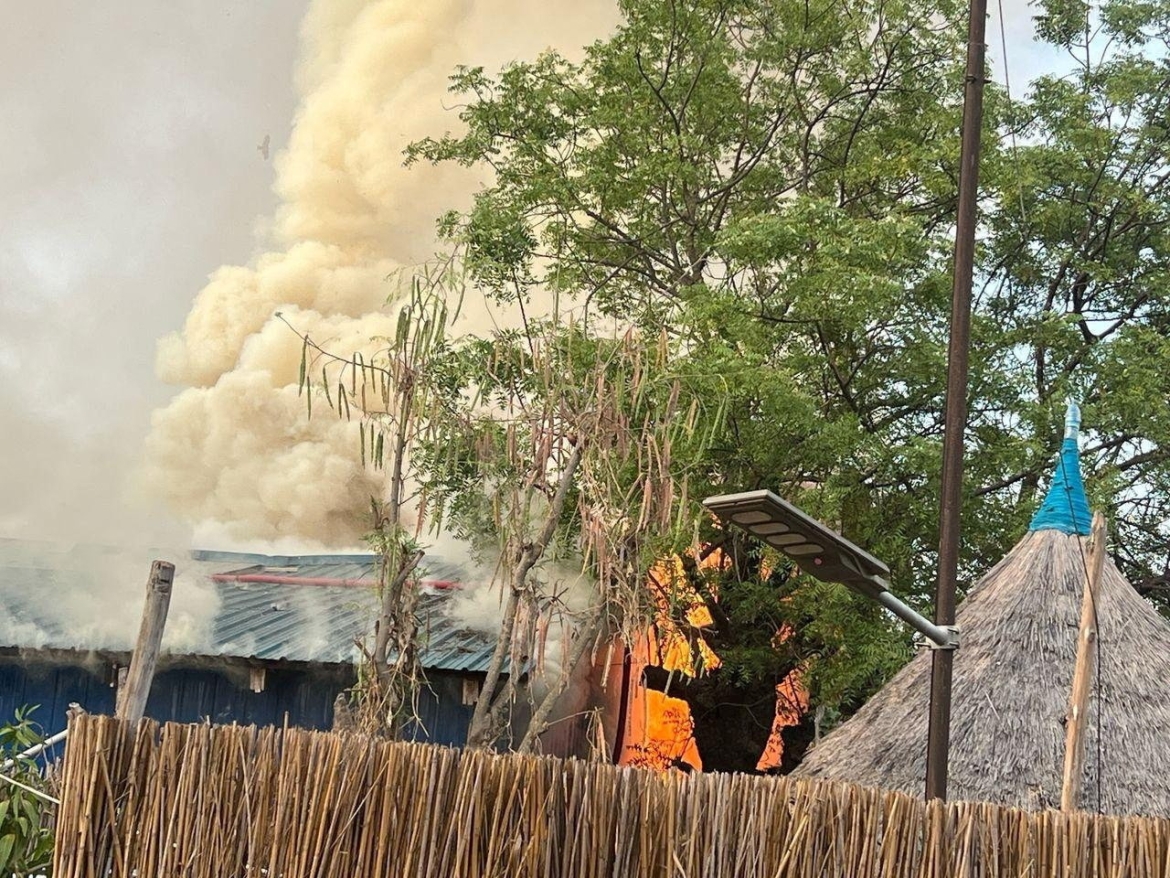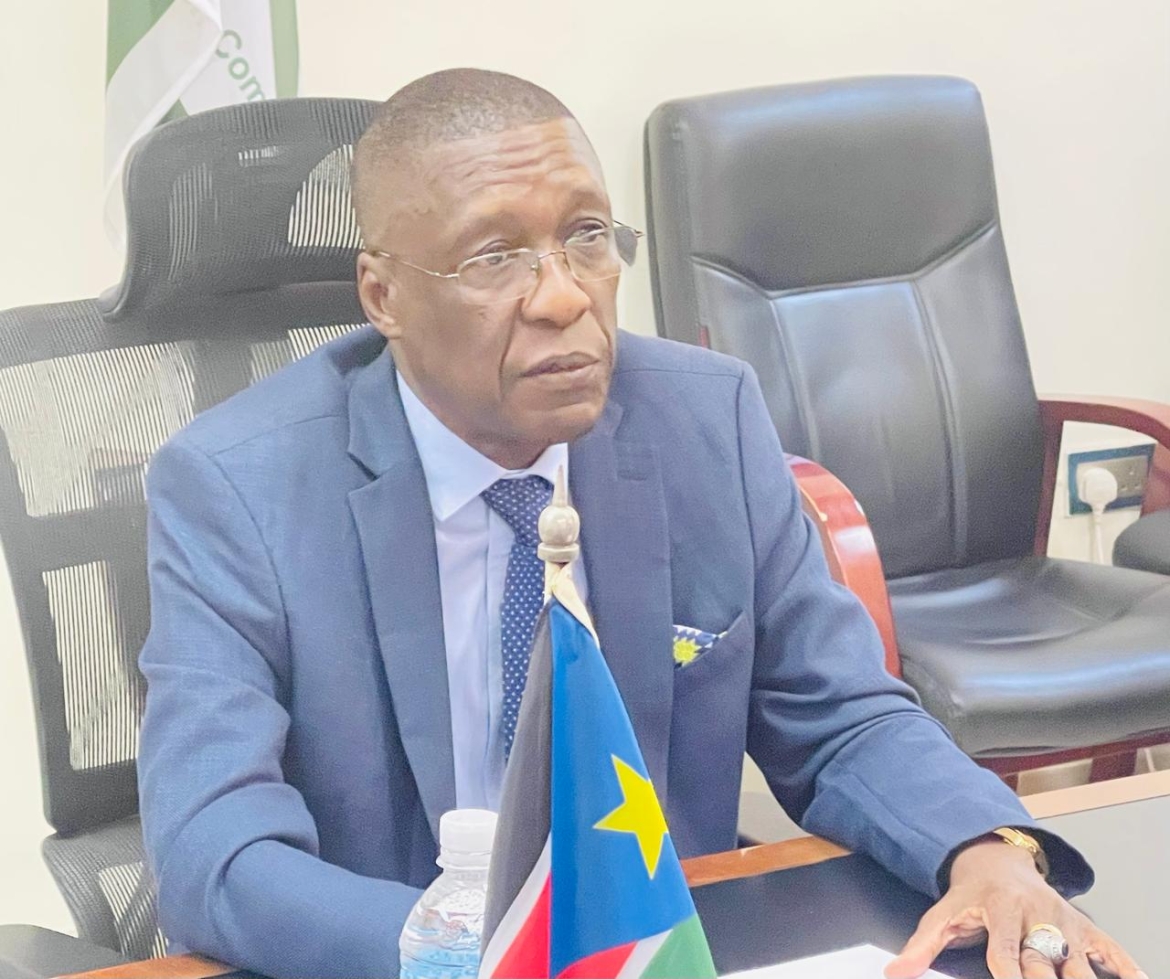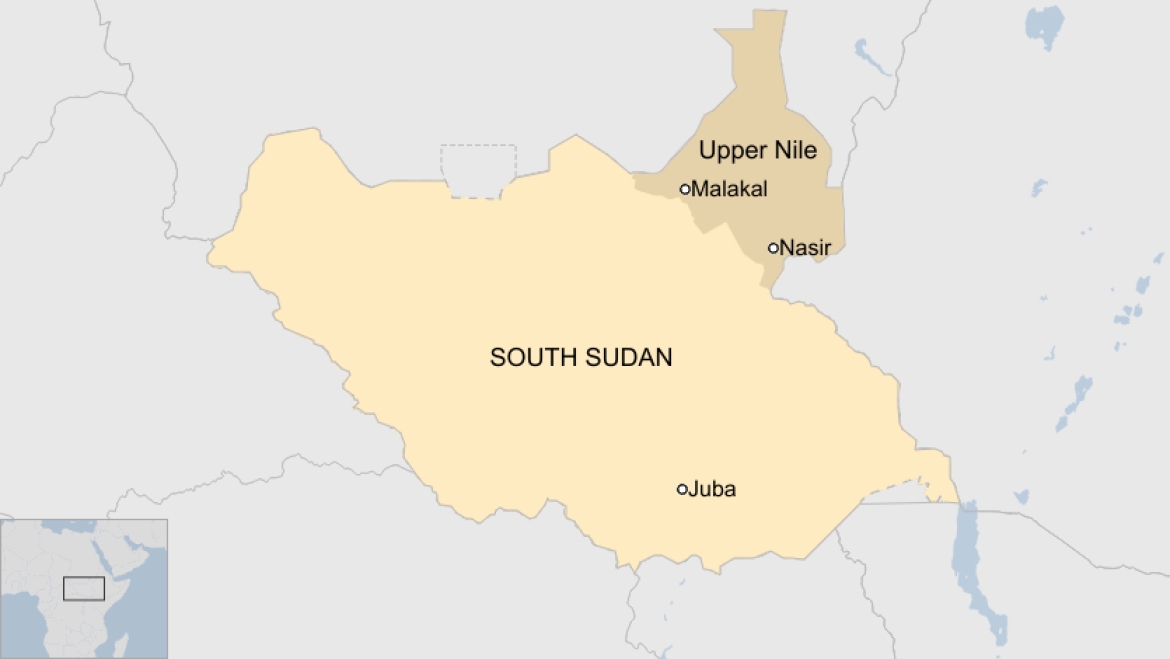RJMEC condemns Fangak attack, calls for speedy probe
The Reconstituted Joint Monitoring and Evaluation Commission (RJMEC) strongly condemns the attack on a market and a medical facilty belonging to the Doctors Without Borders/Médecins Sans Frontières (MSF) in Old Fangak, Jonglei State, on Saturday 3rd May 2025.
RJMEC STRONGLY CONDEMNS ATTACK ON CIVILIANS AND MSF MEDICAL FACILITY IN OLD FANGAK, JONGLEI STATE, LEADING TO DEATHS, DESTRUCTION
Communication Office
PRESS RELEASE
(For Immediate Publication)
Sunday, 4 May 2025 Juba, South Sudan
RJMEC STRONGLY CONDEMNS ATTACK ON CIVILIANS AND MSF MEDICAL FACILITY IN OLD FANGAK, JONGLEI STATE, LEADING TO DEATHS, DESTRUCTION
The Reconstituted Joint Monitoring and Evaluation Commission (RJMEC) strongly condemns the attack on a market and a medical facilty belonging to the Doctors Without Borders/Médecins Sans Frontières (MSF) in Old Fangak, Jonglei State, on Saturday 3rd May 2025.
The aerial assault reportedly resulted in the loss of lives, injuries and destruction of vital infrasture and crucial medical supplies. According to MSF, at least seven individuals were killed and scores wounded during the early morning attack.
Sadly, this latest incident is yet another escalation and a setback to the implementation of the Revitalised Agreement on the Resolution of the Conflict in the Republic of South Sudan (R-ARCSS),which has suffered from repeated gross violations in recent weeks.
RJMEC reminds the Parties to the Agreement that the R-ARCSS explicitly prohibits any attacks on unarmed civilians and humanitarian agencies. Such violent actions not only breach the terms of the Agreement but also undermine ongoing efforts to build lasting peace and stability through constructive and inclusive political dialogue.
RJMEC therefore, urges the Ceasefire and Transitional Security Arrangements Monitoring and Verification Mechanism (CTSAMVM) to expeditiously and thoroughly investigate the incident.
The Commission further calls on the relevant authorities to ensure CTSAMVM is granted full support, safe, and unhindered access to the affected area to carry out its mandate effectively. In this regard the Commission further appeals to United Nations Mission in South Sudan (UNMISS) to provide logistical support to CTSAMVM to effectively and efficiently complete the investigation.
RJMEC Quarterly Report: Repeated violations ground R-ARCSS implementation to a halt
The Reconstituted Joint Monitoring and Evaluation Commission (RJMEC) has today released its Quarterly Report on the status of implementation of the Revitalised Agreement on the Resolution of the Conflict in the Republic of South Sudan (R-ARCSS).
RJMEC RELEASES ITS LATEST QUARTERLY REPORT, SAYS IMPLEMENTATION OF THE AGREEMENT GROUND TO A HALT, AS PARTIES ENGAGED IN REPEATED VIOLATIONS
Communication Office
PRESS RELEASE
(For Immediate Publication)
Monday, 28 April Juba, South Sudan
RJMEC RELEASES ITS LATEST QUARTERLY REPORT, SAYS IMPLEMENTATION OF THE AGREEMENT GROUND TO A HALT, AS PARTIES ENGAGED IN REPEATED VIOLATIONS
The Reconstituted Joint Monitoring and Evaluation Commission (RJMEC) has today released its Quarterly Report on the status of implementation of the Revitalised Agreement on the Resolution of the Conflict in the Republic of South Sudan (R-ARCSS).
In the report covering the 1st quatter of the year January – March 2024 and is prepared pursuant to Article 7.9 of the R-ARCSS, the Commission observed “repeated violations” of the Revitalised Agreement saying, “During the quarter, implementation of the Agreement ground to a halt, as the Parties engaged in repeated violations of the R-ARCSS and the political and security environment markedly worsened.”
The report continues, “In scenes not seen since the signing of the R-ARCSS over six years ago, armed conflict and violence erupted across the country, several high-ranking opposition members and Parliamentarians were detained and imprisoned and the First Vice President Dr Riek Machar Teny was put under house arrest.”
“In addition, ministerial positions at the state and national levels and those within the Presidency were reshuffled, and portfolios within some Agreement institutions and mechanisms were abandoned,” the report added. “In some parts of the country, civilians including women and children have borne the brunt of the fallout and have suffered serious human rights and humanitarian law violations including death, injury and displacement due to military operations and connected armed clashes.”
However, the Commission reiterates that the R-ARCSS remains the most viable framework to steer South Sudan towards the path of stability and prosperity, adding that the current political and security situation is fragile and highly volatile, posing a serious threat to the survivability of the R-ARCSS.
This is due to various factors, including:
· several weeks of armed violent clashes between forces of the SSPDF and SPLM/A-IO, both parties to the Revitalized Peace Agreement. These clashes are now spreading to several areas across the country, including reported attacks on some cantonment sites and training centres such as Luri, Rajaf, and Panyume, among others;
· arrest and continuous detention of some senior SPLM/A-IO political and military leaders who are integral to the implementation of the R-ARCSS and critical for its full implementation;
· removal and replacement of some opposition leaders from various portfolios at the national and state levels without consultation, consensus and compromise with the concerned Parties, as provided for in the R-ARCSS;
· abandonment of official portfolios, including that of some Agreement Institutions and Mechanisms by SPLM/-IO leaders and officials out of fear of being targeted for arrest and/or detention; and
· the inability of the leadership of the parties to dialogue and resolve the emerging security and political challenges within the framework of the Revitalized Peace Agreement.
These factors, the Commission says, have contributed to heightening of political tensions, and undermining of trust and confidence built between the peace partners over the six years of implementation, thereby potentially eroding all possibilities of implementing the R-ARCSS, especially at this critical time.
“It is worth noting that in this two-year extension of the Agreement, there are less than 20 months left to elections in December 2026.”
In its conclusion, the Commission underscores that, “the heightening of political and security tensions in South Sudan does not bode well for the sustaining of durable peace.” “Every effort must be made by the Parties to the Agreement to adhere strictly to the R-ARCSS and recommit themselves to the cause of peace. While the trust among the Parties has been seriously dented there remains some room for re-engagement and dialogue.”
“It is important that Parties resort back to strict adherence to the CoHA (Cessation of Hostilities Agreement), and the cardinal princples stipulated in Chapter II as well as undertake an immediate cessation of hostilities on all fronts”.
Also, “efforts must be stepped up to complete the unification of forces, unconditional release of those detained, and move forward with the Constitution-making process.”
THE FULL REPORT: https://bit.ly/42U9Xog
RJMEC: The current situation in South Sudan is deeply concerning
The Reconstituted Joint Monitoring and Evaluation Commission (RJMEC) on Tuesday 18 March, 2025 addressed the 1265th African Union Peace and Security Council (AUPSC).
THE CURRENT SITUATION IN SOUTH SUDAN IS DEEPLY CONCERNING
Communication Office
PRESS RELEASE
(For Immediate Publication)
Tuesday, 18 March 2025, Juba, South Sudan
THE CURRENT SITUATION IN SOUTH SUDAN IS DEEPLY CONCERNING
The Reconstituted Joint Monitoring and Evaluation Commission (RJMEC) on Tuesday 18 March, 2025 addressed the 1265th African Union Peace and Security Council (AUPSC).
In his statement to the Council held virtually, RJMEC Chairperson, Amb. Maj. Gen. (rtd) George Owinow observed that the Revitalised Agreement on the Resolution of the Conflict in the Republic of South Sudan (R-ARCSS) is facing the most serious challenges since its signing in September 2018.
In his statement, Amb. Gen. Owinow said reports in January and February this year of armed clashes involving forces belonging to Parties signatory to the Agreement in Western Equatoria and Western Bahr el Ghazal States were followed by clashes in Nasir County, Upper Nile State.
“As a result, political tensions in Juba and around the country are heightened, and there is urgent need to prevent them from rising any further,” he said.
In his recommendations to the Council, Amb. Gen. Owinow reiterated the need for the leadership of the Parties to the R-ARCSS to desist from actions that may escalate tensions, undertake constructive dialogue, and to speak with one voice.
He called on the AU Peace and Security Council to prevail on the Parties to the Revitalised Peace Agreement to cease all actions that further undermine trust and confidence in the peace process, and reactivate the functioning of the security mechanisms.
Additionally, the Chairperson said, the Revitalised Transitional Government of National Unity (RTGoNU) should prioritise the completion of Phase I of the unification of forces and commence Phase II, as well as Disarmament, Demobilisation, and Reintegration (DDR), and proceed with the constitution-making process and preparations for the conduct of free, fair and credible elections in December 2026.
“Consider activating existing mechanisms in support of South Sudan, which could include the Panel of the Wise, to proactively engage with the Parties going forward in a spirit of dialogue and reconciliation,” General Owinow added.
ENDS
H.E AMB. MAJ GEN. (RTD) GEORGE AGGREY OWINOW INTERIM CHAIRPERSON OF RECONSTITUTED JOINT MONITORING AND EVALUATION COMMISSION WITH AU PEACE AND SECURITY COUNCIL DELIVERED VIRTUALLY 18 MARCH 2025
- Chairperson of the AU Peace and Security Council,
- Commissioner for the AU Political Affairs, Peace and Security
- Your Excellencies, Distinguished Permanent Representatives
- Ladies and Gentlemen
Your Excellency,
1. It is my distinct honour to address this august Council for the first time as the new Interim Chairperson of the Reconstituted Joint Monitoring and Evaluation Commission (RJMEC). I took over this position in February 2025.
2. The current situation in the Republic of South Sudan is deeply concerning, and the Revitalised Peace Agreement is facing the most serious challenges since its signing in September 2018.
3. Although the Transitional Period of the Revitalised Peace Agreement was extended for another two years from 22nd February 2025, with elections scheduled for December 2026, the slow pace of its implementation has long been worrying.
4. Reports in January and February 2025 of armed clashes involving forces belonging to Parties signatory to the Agreement in Western Equatoria and Western Bahr el Ghazal States were followed by clashes in Nasir County, Upper Nile State. These clashes were preceded by some contentious political decisions made in Juba by Presidential decree weakening the IO, as well as arrest of senior politicians and members of its armed forces.
5. On the recent case of Nasir, in RJMEC’s assessment, it appears that a rotation of SSPDF forces who are garrisoned there turned into armed clashes involving forces of the Parties signatory to the Agreement, as well as local militia. These clashes caused several fatalities, including a UN helicopter crew member.
6. As a result, political tensions in Juba and around the country are heightened, and there is urgent need to prevent them from rising any further.
Your Excellency,
7. Given the aforementioned, I would like to conclude with some recommendations to this Council:
i. urge the leadership of all the Parties to the R-ARCSS to desist from actions that may escalate tensions, undertake constructive dialogue, speak with one voice and to demonstrate their commitment not to return the country to war through regular scheduled Presidency meetings and joint messaging;
ii. prevail on the Parties to the Revitalised Peace Agreement to cease all actions that further undermine trust and confidence in the peace process, and reactivate the functioning of the security mechanisms;
iii. urge the RTGoNU to prioritise the completion of Phase I of the unification of forces and commence Phase II, as well as DDR, and proceed with the constitution-making process and preparations for the conduct of free, fair and credible elections in December 2026; and
iv. Consider activating existing mechanisms in support of South Sudan, which could include the Panel of the Wise, to proactively engage with the Parties going forward in a spirit of dialogue and reconciliation.
8. Finally, RJMEC welcomes the efforts and resolutions of the 43rd Extraordinary IGAD Heads of State and Government meeting, held on 12 March, as a strong catalyst to the South Sudan’s peace process.
I Thank You
RJMEC: Address deadly violence in Nasir County in Upper Nile State, investigate, punish perpetrators
The Reconstituted Joint Monitoring and Evaluation Commission (RJMEC), strongly condemns the violence in Upper Nile State and the abhorrent March 7 attack on a United Nations Mission in South Sudan (UNMISS) helicopter during an evacuation mission in Nasir County.
RJMEC Condemns the deadly violence in Nasir County in Upper Nile State, calls for speedy investigation, accountability
Communication Office
PRESS RELEASE
(For Immediate Publication)
Sunday, 09 Feb. 2025 Juba, South Sudan
RJMEC Condemns the deadly violence in Nasir County in Upper Nile State, calls for speedy investigation, accountability
The Reconstituted Joint Monitoring and Evaluation Commission (RJMEC), strongly condemns the violence in Upper Nile State and the abhorrent March 7 attack on a United Nations Mission in South Sudan (UNMISS) helicopter during an evacuation mission in Nasir County.
An UNMISS crew member and numerous members of forces belonging to the Parties to the Revitlised Agreement on the Resolution of the Conflict in the Republic of South Sudan (R-ARCSS) lost their lives, with many others sustaining serious injuries.
At the outset, RJMEC conveys condolences to all the bereaved families, following the unfortunate and avoidable act of violence. RJMEC calls upon all the Parties involved to immediately cease any further hostilities, give dialogue a chance and ensure calm is quickly restored.
In this regard, the Commission appeals to the Presidency of the Revitalised Transitional Government of National Unity (RTGoNU) to take all necessary actions to further de-escalate the situation. The Commission further urges the Joint Defence Board (JDB) to deligently exercise its command and control functions and responsibilities over all the organised forces.
Additionally, the Commission urges to the National Transitional Committee (NTC) to expeditiously fastrack the unification and deployment of all forces to maintain peace throughout the country to avert the recurrence of such incidents in the future.
With barely two weeks into the extended Transitional Period, violations of the Permanent Ceasefire threatens the gains made over the past seven years since the Revitalized Peace Agreement was signed, and undermines confidence among South Sudan people, regional and international community.
Lastly, RJMEC asks the Ceasefire and Transitional Security Arrangements Monitoring and Verification Mechanism (CTSAMVM), to undertake a verification mission to the area, and provide a detailed report with recommendations.
ENDS
A joint call for calm: Address tensions in Upper Nile, WES, WBGS
Juba, 27 Feb. 25 2025: The African Union Mission in South Sudan (AUMISS), the Inter-governmental Authority on Development (IGAD), the United Nations Mission in South Sudan (UNMISS) and the Reconstituted Joint Monitoring and Evaluation Commission (RJMEC) are gravely concerned about ongoing tensions in Upper Nile State, as well as clashes involving forces of the signatory Parties to the Revitalized Agreement on the Resolution of the Conflict in the Republic of South Sudan (R-ARCSS) in Western Equatoria and Western Bahr el Ghazal States.
Specifically, AUMISS, IGAD, UNMISS and RJMEC call upon the Parties to urgently work together through the established mechanisms of the R-ARCSS to de-escalate the situation in order to restore calm in Upper Nile State.
According to the Ceasefire and Transitional Security Arrangements Monitoring and Verification Mechanism (CTSAMVM), the security situation in Upper Nile state in particular, has significantly deteriorated in past weeks. This has been heightened by the ongoing rotation of forces in Nasir, raising concerns about the likelihood of widespread violence.
AUMISS, IGAD, UNMISS and RJMEC, therefore, call upon the leadership of the Revitalised Transitional Government of National Unity (RTGoNU) and the Joint Defence Board (JDB) to work collegially, and swiftly remedy the persistent security concerns in all the three states. We caution that if left unaddressed, these incidents could potentially undermine the Permanent Ceasefire, which remains the cornerstone of the Revitalized Peace Agreement.
Lastly, we once again underscore the need to progress the full and rapid unification and urgent deployment of the Necessary Unified Forces to boost public faith and trust in the RTGoNU’s commitment to lasting peace and stability in South Sudan, at this critical time as the country commences the fourth extension of its ongoing Transitional Period.
AUMISS, IGAD, UNMISS and RJMEC urge Government to immediately address tensions in Upper Nile, Western Equatoria and Western Bahr el Ghazal
Juba, 27 Feb. 25 2025: The African Union Mission in South Sudan (AUMISS), the Inter-governmental Authority on Development (IGAD), the United Nations Mission in South Sudan (UNMISS) and the Reconstituted Joint Monitoring and Evaluation Commission (RJMEC) are gravely concerned about ongoing tensions in Upper Nile State, as well as clashes involving forces of the signatory Parties to the Revitalized Agreement on the Resolution of the Conflict in the Republic of South Sudan (R-ARCSS) in Western Equatoria and Western Bahr el Ghazal States.
Specifically, AUMISS, IGAD, UNMISS and RJMEC call upon the Parties to urgently work together through the established mechanisms of the R-ARCSS to de-escalate the situation in order to restore calm in Upper Nile State.
According to the Ceasefire and Transitional Security Arrangements Monitoring and Verification Mechanism (CTSAMVM), the security situation in Upper Nile state in particular, has significantly deteriorated in past weeks. This has been heightened by the ongoing rotation of forces in Nasir, raising concerns about the likelihood of widespread violence.
AUMISS, IGAD, UNMISS and RJMEC, therefore, call upon the leadership of the Revitalised Transitional Government of National Unity (RTGoNU) and the Joint Defence Board (JDB) to work collegially, and swiftly remedy the persistent security concerns in all the three states. We caution that if left unaddressed, these incidents could potentially undermine the Permanent Ceasefire, which remains the cornerstone of the Revitalized Peace Agreement.
Lastly, we once again underscore the need to progress the full and rapid unification and urgent deployment of the Necessary Unified Forces to boost public faith and trust in the RTGoNU’s commitment to lasting peace and stability in South Sudan, at this critical time as the country commences the fourth extension of its ongoing Transitional Period.
[ENDS]
HANDOVER SPEECH BY H.E. MAJ GEN (rtd) CHARLES TAI GITUAI CBS OUTGOING RJMEC INTERIM CHAIRPERSON ON THE OCCASION OF THE HANDOVER CEREMONY FOR THE INCOMING INTERIM CHAIRPERSON OF RJMEC, 21 February 2025 Juba, South Sudan
. Hon. Minister for Foreign Affairs and International Cooperation
- Hon. Ministers
- IGAD Special Envoy for South Sudan
- Incoming RJMEC Chair
- Representative of the IGAD Executive Secretary
- Distinguished Guests
- Diplomatic Corps
- Ladies and Gentlemen
Good Afternoon!
1. Today marks the conclusion of my tenure in the Republic of South Sudan as the Interim Chair of RJMEC, the institution which oversees, monitors and evaluates the status of implementation of the Revitalized Agreement on the Resolution of the Conflict in the Republic of South Sudan (R-ARCSS).
2. When I assumed this duty in August 2020, South Sudan stood at a critical juncture. The RTGoNU has just been established, the COVID-19 pandemic was ravaging the world and had stalled implementation of the R-ARCSS. This was also the time the Parties were in the process of establishing the remaining governance structures at the national, state and County levels.
3. Over the past 4½ years, I have also witnessed first-hand the dedication and resilience of the South Sudanese people, their unwavering desire for peace, and their commitment to building a better future for themselves and generations to come.
4. This is a moment of reflection, acknowledging both the progress made and the challenges that remain on the path to lasting peace and stability in this remarkable nation.
5. Notwithstanding challenges, we have jointly witnessed significant strides during my tenure. The guns have largely fallen silent since the signing of the R-ARCSS in 2018, a testament to the commitment of the parties to the permanent ceasefire. Key institutions were reconstituted, and progress have been made in various thematic areas, though a lot more is desired. In that regard, I commend the efforts of the Revitalized Transitional Government of National Unity, the Parties to the Agreement, and all stakeholders for achieving the various milestones.
6. However, the peace journey is far from over. I would like to reiterate the need to focus on key provisions of the Agreement to be implemented. The tasks include, among others, the making of the permanent constitution, unification of forces, judicial reforms and adequate preparations for elections. The completion of these tasks will make post-elections attractive and guarantees the rule of law.
7. Inter-communal violence remains a concern, threatening the peace. The humanitarian situation is dire, with millions still in need of assistance. More political will and trust among the political leaders, and adequate funding can help alleviate some of these challenges.
8. The upcoming elections in 2026 present another critical juncture for South Sudan. It is imperative that these elections are conducted in a free, fair, and transparent manner, ensuring the full participation of all South Sudanese and reflecting the will of the people. RJMEC will play a crucial role in monitoring the electoral process to ensure its credibility.
9. As the path ahead is travelled, processes of transitional justice should not be delayed. These processes are critical in promoting the healing within the South Sudanese society. The Commission for Truth, Reconciliation and Healing and the Compensation and Reparation Authority will need to be established to foster reconciliation and healing, and many more.
10. Moreover, the gender provisions of the Agreement are as important as ever. The RTGoNU needs to continue to give them the care and attention they deserve. Also, let us not forget to support the most vulnerable population of this country – the South Sudanese returnees and IDPs in all your respective interventions. They deserve to live in dignity to enable them participate in the ongoing peace process.
11. As the extended Transitional Period gets underway, let me reiterate what I have always said before: the R-ARCSS offers a beacon of hope, a roadmap towards a brighter future. All parties and peace stakeholders are therefore encouraged to renew their commitments to the full implementation of the R-ARCSS during the extended period. Peace is not merely the absence of war; it is the presence of justice, development, and inclusivity. It requires sustained dialogue, compromise, and a genuine commitment to putting the interests of the South Sudanese people first.
Excellencies, Ladies and Gentlemen,
12. Throughout my time with RJMEC, I received much support from the people of South Sudan, as well criticisms. I take them in good faith. I wished I left this country with free and fair elections having been conducted in 2024. It is my hope that the two years extension will be the last. I therefore appeal to the leaders of this country to demonstrate a sense of urgency and immediately commence preparations for elections, focusing on priority areas.
13. I would like to commend H.E. Salva Kiir Mayardit, First Vice President Dr Riek Machar, Vice Presidents and all other party leaders for staying the course of peace and within the Agreement provisions. I am confident that the leaders of South Sudan shall continue to guide this country during this extended period within the spirit of collegiality, consensus and collaboration.
14. I would also like to take this opportunity to thank His Excellency President Dr William Ruto, the Government of the Republic of Kenya and IGAD, for affording me this opportunity to lead such an esteemed peace commission in South Sudan
15. Further, I sincerely thank the international partners who have continued to finance the operations and logistics of RJMEC, allowing us to faithfully discharge our mandate. Your continuous support to RJMEC is highly appreciated.
16. I would also like to thank the 43 members of RJMEC, for their commitment, devotion and focus. These distinguished members have participated in 29 plenary meetings during my watch and of which I have chaired over the period. They have played their role with diligence and distinguished devotion to duty. Their efforts and contributions, including the Working Committees that they continue to participate in, is commendable and is invaluable in the South Sudan peace process.
17. To my very able staff at the RJMEC Secretariat, led ably by Chief of Staff, Ambassador Berhanu Kebede: your tireless work and commitment has been of great help in my role as Chair, to all the RJMEC members and the people of South Sudan. As I hand over this RJMEC family to my successor, I am persuaded to believe that this family will provide him as much support as they have given me.
18. Finally, I would like to thank my wife, children and grandchildren who have supported me as they endured my long intermittent absence from the family engagements. This has been their contributions to the South Sudan peace process.
19. In conclusion, I wish my successor, Ambassador Major General (rtd) George Aggrey Owinow, every success in his role as Interim Chairperson of RJMEC. I have known him for a very long time and am pleased to call him a friend. I am sure his experience and judgement will stand RJMEC in excellent stead for the coming extended period.
20. I appeal to all of you to offer him the same level of support and cooperation as you did to me, and in doing so, I know that the mandate of RJMEC will continue to be discharged professionally, impartially and faithfully.
Farewell. Kwaheri ya Kuonana. Wadae. Adieu!
May God Bless You, and May God Bless South Sudan.
I Thank You.


